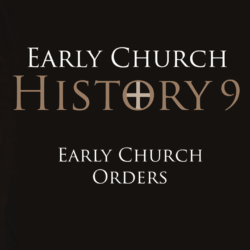This is part 14 of the Read the Bible For Yourself.
The Pastoral Epistles are letters to church leaders, instructing them how churches should function. Though they are not well read by most Christians today, they remain authoritative for pastors, elders, and deacons. Today we’ll cover 1-2 Timothy, Titus, and Philemon. We’ll explore the major theme of how the church should be a well-run household where godliness prevails. Additionally, we’ll consider qualifications for leadership, warnings against false teachers, and the incredible importance of sound teaching.
Listen to this episode on Spotify or Apple Podcasts
—— Links ——
- See other episodes in Read the Bible For Yourself
- Other classes are available here, including How We Got the Bible, which explores the manuscript transmission and translation of the Bible
- Get the transcript of this episode
- Support Restitutio by donating here
- Join our Restitutio Facebook Group and follow Sean Finnegan on Twitter @RestitutioSF
- Leave a voice message via SpeakPipe with questions or comments and we may play them out on the air
- Intro music: Good Vibes by MBB Attribution-ShareAlike 3.0 Unported (CC BY-SA 3.0) Free Download / Stream: Music promoted by Audio Library.
- Who is Sean Finnegan? Read his bio here
—— Notes ——
The Pastoral Epistles
- 1 Timothy, 2 Timothy, Titus, Philemon
- Philemon is not always included as a pastoral Epistle since it only deals with a specific issue regarding a single person.
Household
- Paul employs the metaphor of a household in the pastorals to illustrate the order he’d like to see in the churches (1 Tim 3:14-15).
- ZIBBC: “In Xenophon’s essay, the husband instructs his fourteen-year-old bride (the average age for marriage among Greek and Roman girls was fourteen to sixteen) on her vital role in managing the household resources, including the care and supervision of household slaves, while he supervised the gathering of produce from the farms. Because of the presence of slaves and freedmen in an average ancient household, management of sometimes large households could be demanding.”[1]
- Lynn Cohick: “The family in the Greco-Roman world valued the community over the individual and promoted corporate honor and fortune. Those living in the domus (“home”) included parents and children, and perhaps extended family, such as adult siblings, cousins, and grandparents, as well as slaves, freedmen, and freedwomen. Each individual had a specific status within the home, and each family member deemed the social status of the family, including its wealth and social prestige, as of equal or greater value than their personal happiness.”[2]
- Paul is concerned for how outsiders will perceive the churches (1 Tim 3:7).
- Everyone has a place and a role.
- Men’s role (1 Tim 2:8), older men (Tit 2:2), younger men (Tit 2:6-8).
- Women’s role (1 Tim 2:9-15), older women (Tit 2:3), younger (Tit 2:4-5)
- Respect elders (1 Tim 5:1-2, 17-19).
- Young widows should marry (1 Tim 5:11-15).
- Take care of your own family (1 Tim 5:7-8, 16).
- Support real widows (1 Tim 5:3-6, 9-10).
- Slaves obey & submit (1 Tim 6:2; T 2:9-10)
- Rich be humble/generous (1 Tim 6:18-19)
Godliness (Eusebia)
- 1 Tim 4:7-8; Tit 2:11-12 (See also 1 Tim 2:1-2; 5:4.)
- Translated “godliness” but has nothing to do with being like God or imitating God.
- Showing expected reverence
- Piety (Latin = pietas)
- Pious, reverent, dutiful
- Shown not just to God (or gods) but also to the city and to one’s household
Church Leadership
Overseer’s qualifications (1 Tim 3:2-7; T 1:7-9)
- Elders’ qualifications (Tit 1:6)
- Deacon’s qualifications (1 Tim 3:8-13)
- Standards are high for service in the church.
- Overseers must manage their own households well (1 Tim 3:4-5).
Warnings Against False Teachers
- Some strange Jewish teachings (1 Tim 1:4, 6-7; Tit 1:10-11, 14)
- Asceticism (1 Tim 4:1, 3)
- Proto-gnostics (1 Tim 6:20)
- Unlabeled false teachings (2 Tim 2:14, 16, 23, 25; Tit 3:9)
- Warn those who cause divisions (twice), then have nothing more to do with them (Tit 3:10-11)
- Names individuals: Hymenaeus & Alexander (1 Tim 1:20), Phygelus & Hermogenes (2 Tim 1:15), Hymenaeus & Philetus (2 Tim 2:17-18), Alexander the coppersmith (2 Tim 4:14)
Sound Teaching (Healthy Doctrine)
- Sin is when you live contrary to healthy doctrine (ὑγιαινούση διδασκαλία) (1 Tim 1:10).
- Sound teaching nourishes you (1 Tim 4:6).
- Encouraged to hold the standard of sound teaching (2 Tim 1:13)
- “People will not put up with sound teaching” (2 Tim 4:3).
- “Rebuke them sharply, so that they become sound in the faith” (Tit 1:14).
- “Teach what is consistent with sound instruction” (Tit 2:1).
Reading the Pastoral Epistles
- Mostly focused on church leadership
- Church leaders NEED to read them.
- The pastorals tell us who is qualified and who is disqualified for church leadership.
- It’s good for everyone to know what they say so you can hold your leaders accountable.
Philemon
- Philemon was a wealthy Christian leader who had a house church.
- His slave, Onesimus, ran away and later became a Christian.
- Paul sent Onesimus back to Philemon, asking Philemon to treat him as a brother.
- This Epistle is a masterful piece of rhetoric, Paul at his finest.
- Ben Witherington III calls Philemon the emancipation proclamation of the NT.
Review
- Paul wrote the pastoral Epistles toward the end of his life.
- The metaphor of a household illustrates how the churches should function.
- Everyone should play their role according to their duty, whether men or women or elderly or young.
- Godliness is a major concept in the pastoral Epistles. It refers to performing your duty with proper honor. It’s important that Christians live respectfully and with proper dignity before a watching and suspicious world.
- The pastoral Epistles include clear qualifications for church leaders, including that they manage their own households well.
- The churches in Ephesus and Crete were beset with false teachers from both Jewish and Greco-Roman sources.
- Paul encourages Timothy and Titus to adhere to sound teaching (healthy doctrine), so that people will escape the dangers of false teachers.
- Philemon was a wealthy church leader who managed a household that included slaves.
- Paul sent Philemon his runaway slave, instructing him to accept Onesimus as a brother.
- Paul told Philemon to charge any debt Onesimus owed him to his account.
- Such a request radically reconfigured social norms in a way that undermined the system of slavery.
[1]Baugh, S. M. “1 Timothy” in Romans to Philemon, vol. 3 of ZIBBCNT-5, ed. Clinton E. Arnold (Grand Rapids: Zondervan, 2002), 444-478.
[2] Lynn H. Cohick, “Women, Children, and Families in the Greco-Roman World,” in The World of the New Testament, ed. Lee McDonald Joel Green (Grand Rapids: Baker Academic, 2013), 179.







Hey Sean,
Thanks for the brief teaching on the meaning if godliness; I had never heard it put that way before. There is one point I would disagree with you about. I don’t think that Paul’s motivation for urging believers to godliness was to stave off persecution, for he said in 2 Tim3:12: “In fact, everyone who wants to live a godly life in Christ Jesus will be persecuted.” Rather, what I think he was after was “so that in every way they will make the teaching about God our Savior attractive,” Tit. 2:10.